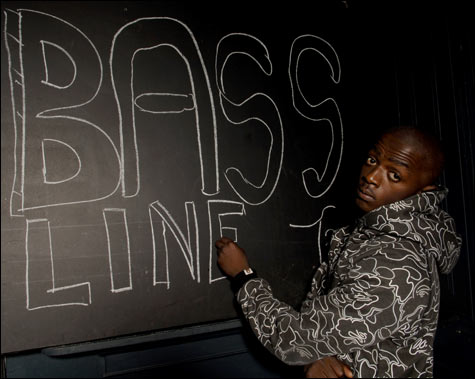
ESSENTIALS: T2’s track “Heartbroken,” featuring Jodie Aysha, is little more than space-age bass and a pretty voice that means exactly what it says. |
The British rave revolution of the late ’80s/early ’90s — a cultural movement that had no real analogue here in the US — is accurately viewed as the source of the ever increasing number of dance genres in the UK. In the last few years, however, the emergence of grime and dubstep — two genres characterized by violent, murky bass and a grim sense of urban decay — has signaled an abandonment of rave’s goodwill and shimmering neon glow. Yes, both genres have produced loads of great music (consider grime artist Dizzee Rascal and dubstep producer Burial), but their hyper-masculine disdain for cheesy fun has worn a little thin. So, in Northern England, a burgeoning new scene has coalesced around a new dance genre, bassline house, that embraces everything that grime and dubstep exclude: femininity, social interaction, and pop hooks aimed directly at the brain’s pleasure receptors. With clattering beats descended from ’90s speed garage and vocals that coyly walk the line between teen pop and R&B, bassline revels in the kind of simplicity and directness usually reserved for pop radio hits. As the name says, however, it’s the bass that leads the way, and the genre’s wacky bass hooks have made it a rapidly growing club phenomenon.
Despite dance music’s emphasis on tracks rather than artists, one producer has managed to position himself at the forefront of bassline’s evolution. T2’s “Heartbroken,” featuring Jodie Aysha, reached the #2 slot on Britain’s pop charts in December, and the song is a terrific example of what makes bassline so appealing. After a chopped and spliced vocal intro and a quick skittering beat, the bass kicks in, a careering, synthesized fuzz that wouldn’t sound out of place in an early-’90s video game. This sets the stage for Jodie, who delivers a understated rendition of a standard lover’s plea. Singing without chest-pounding desperation or growling sexual energy, Jodie is emotional — heartbroken, in fact, and movingly so — but she doesn’t overemote. Aside from some synthesizer strings, that’s all there is: space-age bass and a pretty voice that means exactly what it says.
Here in the US — the land of Britney Spears’s “I’m a Slave for U” and Justin Timberlake’s “Sexy Back” — it’s hard not to equate pop with sex. Bassline, however, largely eschews double entendres. Take producer TS7’s track “Smile,” where singer Tonia Kodh breaks off from praising her man to address the listener: “I know there’ll be people thinking sexual things about what I just said/But it goes to show you that the simplest things can be misread.” The lyrics that follow are flipside of Jodie’s sweetly melancholic heartache: “This guy, he took his time to know me. . . . He makes me smile.” And that’s that. For all the genre’s outrageous bass pyrotechnics, bassline stays away from the kind of extreme emotions and overplayed vocals that characterize the usual dance diva, ever in a world of Ecsta-cee-ee-ee-ee.